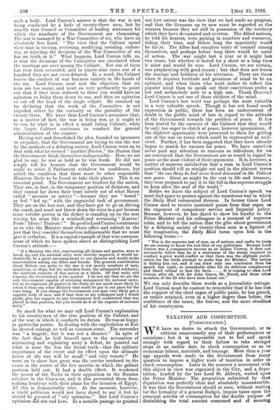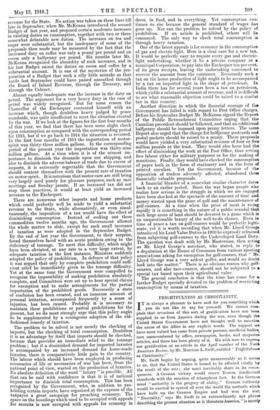TAXATION AND CONSUMPTION. [COMMUNICATED.] W E have no desire to attack
the Government, or to criticize unnecessarily any of their performances or omissions ; but it is impossible not to feel and speak strongly with regard to their failure to take stronger steps at an earlier date to check consumption so as to economize labour, materials, and tonnage. More than a year ago appeals were made to the Government from many quarters to impose a higher scale of taxation in order to check consumption. Later in the summer a movement with this object in view was organized in the City, and a depu- tation, headed by the late Lord St. Aldwyn, waited upon the Prime Minister. The proposition submitted by that deputation was perfectly clear and absolutely unanswerable. It was that the Government should at once, without waiting for the formality of a general Budget, impose taxes upon the principal articles of consumption for the double purpose of diminishing the total amount consumed' and of securing revenue for the State. No action was taken on these lines till late in September, when Mr. McKenna introduced the second Budget 'of last year, and proposed certain moderate increases in existing duties on consumption, together with two or three somewhat debatable new duties. The increases on tea and sugar were substantial, but the inadequacy of some of the proposals then made may be measured by the fact that the increased duty on coffee was only a penny per pound and on cocoa only a halfpenny per pound. Six months later Mr. McKenna recognized the absurdity of such increases, and in his last Budget raised the duties on cocoa and coffee by a substantial amount. It is one of the mysteries of the pre- paration of a Budget that such a silly little mistake as that made last September could have passed unscathed through the Board of Inland Revenue, through the Treasury, and through the Cabinet.
Almost equally inadequate was the increase in the duty on petrol. The argument for a very heavy duty in the case of petrol was widely recognized. But for some reason the Chancellor of the Exchequer contented himself with an increase which, though doubtless heavy judged by peace standards, was quite insufficient to meet the situation created by the war. If we look at the figures for the first four months of this year, we find that there has been some slight check upon consumption as compared with the corresponding period for 1915, but if we go back to 1914 the situation is reversed. In the first four months of 1914 the importation of motor- spirit was thirty-three million gallons. In the corresponding period of the present year the importation was thirty-nine million gallons. At a time when it is of the utmost im- portance to diminish the demands upon our shipping, and also to diminish the adverse balance of trade due to excess of imports, it is extremely regrettable that the Government should content themselves with the present rate of taxation on motor-spirit. It is notorious that motor-cars are still being very largely used purely for pleasure purposes, such as race meetings and Sunday jaunts. If an increased tax did not stop these practices, it would at least yield an increased revenue to the Exchequer.
There are numerous other imports and home products which could perfectly well be made to yield a substantial revenue to the State, while alternatively, or even simul- taneously, the imposition of a tax would have the effect of diminishing consumption. Instead of seeking out these commodities twelve months ago, the Government allowed the whole matter to slide, except for such small increases of taxation as were adopted in the September Budget. By the end of last year the Government, to their surprise, found themselves faced with an acute problem owing to the deficiency of tonnage. To meet this difficulty, which might have been obviated, at any rate to a very large extent, by adequate taxation in the first instance, Ministers suddenly adopted the policy of prohibition. In defence of that policy it was argued that only by complete prohibition could suffi- cient relief be immediately given to the tonnage difficulty. Yet at the same time the Government were compelled to recognize the impossibility of making prohibition absolutely complete, and Committees were set up to hear special claims for exemption and to make arrangements for the partial importation of the prohibited goods. Necessarily a state of confusion has been created, and an immense amount of personal irritation, accompanied frequently by a sense of injustice, has been caused. Probably it is necessary to maintain these prohibitions or partial prohibitions for the present, but we do most strongly urge that this policy ought to be supplemented by a courageous adoption of the old- fashioned remedy of taxation.
The problem to be solved is not merely the checking of imports, but the checking of total consumption. Doubtless it is an advantage by itself that imports should be checked, because that provides an immediate relief to the tonnage problem ; but if a diminished demand for imported luxuries is accompanied by an increased demand for home-made luxuries, there is comparatively little gain to the country. The labour which should have been employed in producing necessaries of life or necessaries of war has been, from the national point of view, wasted on the production of luxuries. No absolute definition of the word " luxury " is possible. All that can be said with confidence is that it is of national importance to diminish total consumption. This has been recognized by the Government, who, in addition to pro- hibiting certain imports, have organized at the expense of the taxpayer a great campaign for preaching economy. The space on the hoardings which used to be occupied with appeals for recruits is now occupied with appeals for economy in dress, in food, and in everything. Yet consumption con- tinues to rise because the general standard of wages has gone up. Nor can the problem be solved by the policy of prohibition. If an article is prohibited, others will be consumed. The only way to check total consumption is through heavy taxation. One of the latest appeals is for economy in the consumption of gas and electric-light. Here is a clear case for a new tax. It would be perfectly easy to require every gas and electric- light undertaking, whether it be a private company or s municipal Corporation, to pay into the Exchequer ten per cent. of its gross receipts, leaving the undertaking concerned to recover the amount from the consumer. Necessarily such a tax on the home production of light ought to be accompanied by a tax on imported light in the shape of petroleum. In India there has for several years been a tax on petroleum, which yields a substantial amount of revenue, and it is difficult to see what reasonable objection could be raised to a similar tax in this country. Another direction in which the financial courage of the Government has failed is with regard to Post Office charges. Before his September Budget Mr. McKenna signed the Report of the Public Retrenchment Committee urging that the Canadian precedent should be followed, and that an additional halfpenny should be imposed upon penny letters. The same Reportt also urged that the charge for halfpenny postcards and postal packets should be raised to a penny. These proposals would have yielded a very substantial revenue of four or five million pounds at the least. They would also have had the effect of diminishing the work at the Post Office, thus setting free labour either for military purposes or for the making of munitions. Finally, they would have checked the consumption of paper both in the form of stationery and in the form of printed circulars. Yet the Government, because of the opposition of traders adversely affected, abandoned these financially valuable proposals.
A financial blunder of a somewhat similar character dates back to an earlier period. Since the war began people who realize how serious is the struggle in which we are engaged have been shocked at the spectacle of the amount of time and money wasted upon the game of golf and the maintenance of golf-courses. At a time when the price of meat is rising rapidly it is something in the nature of a public scandal that such large areas of land should be devoted to a game which is an unquestionable luxury of the well-to-do classes. Even in time of peace a tax on golf-courses would be perfectly legiti- mate, yet it is worth recording that when Mr. Lloyd George introduced his Land Value Duties in 1909 he expressly refrained from subjecting golf-courses to the Undeveloped Land Duty. The question was dealt with by Mr. Masterman, then acting as Mr. Lloyd George's assistant, who stated, in reply to a deputation at the House of Commons from various sporting associations asking for exemption for golf-courses, that " Mr. Lloyd George was a very ardent golfer, and would no doubt look into the matter." There is no obvious reason why golf- courses, and also race-courses, should not be subjected to a special tax based upon their agricultural value. The general conclusion is that the time has come for a further Budget specially devoted to the problem of restricting consumption by means of taxation.



























 Previous page
Previous page